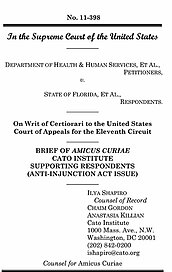Learn more about Cato’s Amicus Briefs Program.
Cato’s third Supreme Court brief in the Obamacare litigation concerns the issue of whether the Anti-Injunction Act prevents federal courts from timely reviewing Congress’s most egregious attempt to exceed its power to regulate interstate commerce. The AIA bars courts from enjoining “any tax” before that tax is assessed or collected. One would think that such a law would have no application to the penalty that enforces the individual health insurance mandate, which is not a tax but rather a punishment for not complying with the mandate. Accordingly, most of the courts to consider the issue have found the AIA to be inapplicable to individual mandate challenges. Moreover, the government itself has long conceded that the AIA does not bar these suits. A Fourth Circuit majority and the dissenting Judge Brett Kavanaugh in the D.C. Circuit, however, reached a contrary conclusion, reasoning that the AIA applies to all exactions assessed under the Internal Revenue Code, including “penalties.” Out of an abundance of caution, and because the AIA may be a jurisdictional bar, the Supreme Court appointed an amicus curiae to argue for the position that the AIA bars these suits. The plaintiffs here — the 26 states, the National Federation of Independent Business, and several individuals — have advanced several strong arguments for why the AIA doesn’t apply. Cato’s brief expands on one of those arguments: that the words “any tax” in the AIA do not include “penalties” simply because they may be codified in the Code. First, we demonstrate that the Supreme Court has always held that “taxes” and “penalties” are not interchangeable for AIA purposes. Second, we show that, with one exception, all of the cases cited in the amicus briefs filed by two former IRS commissioners, Mortimer Caplin and Sheldon Cohen — which appear to have heavily influenced the Fourth Circuit and Judge Kavanaugh — concerned penalties that were statutorily defined as taxes. This refutes the commissioners’ erroneous claim that those cases concerned penalties that were not defined as taxes. As we say in our brief, “the influence of Amici Caplin & Cohen’s [D.C. Circuit] brief is surpassed only by its misdirection.” The one exception is the Mobile Republican case (Eleventh Circuit 2003), which we explain is properly understood as applying the AIA to penalties that enforce substantive tax provisions. In short, the AIA cannot bar suits to enjoin the individual mandate penalty because that penalty neither is defined as a tax nor enforces a substantive tax provision.

This work is licensed under a Creative Commons Attribution-NonCommercial-ShareAlike 4.0 International License.
